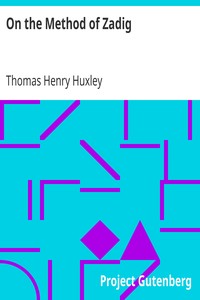On the Method of Zadig by Thomas Henry Huxley
"On the Method of Zadig" by Thomas Henry Huxley is a philosophical essay drawn from his broader work "Science and Hebrew Tradition," likely written during the late 19th century. This scientific publication explores the nature of knowledge and reasoning through the allegorical character of Zadig, a philosopher from Voltaire's literary creation. Huxley delves into the methods of scientific inquiry, demonstrating how retrospective analysis leads to insights about the past and the underlying
principles of nature. In this essay, Huxley recounts the story of Zadig, who, despite never having seen the Queen's spaniel or the King's horse, uses his powers of observation and reasoning to deduce their characteristics. This exploration emphasizes the idea of "retrospective prophecy," wherein knowledge about past events is derived from observable evidence and logical reasoning, paralleling modern scientific methods such as archaeology and paleontology. By connecting Zadig's approach to that of contemporary scientific practices, Huxley advocates for the value of empirical observation, drawing a connection between the philosophical foundations of the past and the rigorous methodologies of science that enable a deeper understanding of the world. (This is an automatically generated summary.)
Read or download for free
| How to read | Url | Size | |||
|---|---|---|---|---|---|
| Read now! | https://www.gutenberg.org/ebooks/2627.html.images | 63 kB | |||
| EPUB3 (E-readers incl. Send-to-Kindle) | https://www.gutenberg.org/ebooks/2627.epub3.images | 95 kB | |||
| EPUB (older E-readers) | https://www.gutenberg.org/ebooks/2627.epub.images | 94 kB | |||
| EPUB (no images, older E-readers) | https://www.gutenberg.org/ebooks/2627.epub.noimages | 87 kB | |||
| Kindle | https://www.gutenberg.org/ebooks/2627.kf8.images | 190 kB | |||
| older Kindles | https://www.gutenberg.org/ebooks/2627.kindle.images | 184 kB | |||
| Plain Text UTF-8 | https://www.gutenberg.org/ebooks/2627.txt.utf-8 | 53 kB | |||
| Download HTML (zip) | https://www.gutenberg.org/cache/epub/2627/pg2627-h.zip | 92 kB | |||
| There may be more files related to this item. | |||||
Similar Books
About this eBook
| Author | Huxley, Thomas Henry, 1825-1895 |
|---|---|
| Title |
On the Method of Zadig Essay #1 from "Science and Hebrew Tradition" |
| Credits | Produced by D. R. Thompson, and David Widger |
| Reading Level | Reading ease score: 43.6 (College-level). Difficult to read. |
| Language | English |
| LoC Class | Q: Science |
| Subject | Science |
| Subject | Evolution |
| Subject | Bible and science |
| Subject | Paleontology |
| Category | Text |
| EBook-No. | 2627 |
| Release Date | May 1, 2001 |
| Most Recently Updated | Jan 22, 2013 |
| Copyright Status | Public domain in the USA. |
| Downloads | 239 downloads in the last 30 days. |
| Project Gutenberg eBooks are always free! | |

